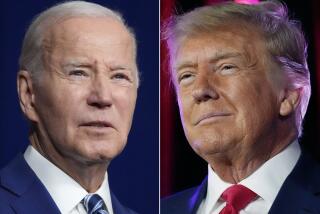Democracy in Pakistan Too
- Share via
Pakistani President Pervez Musharraf’s usurping of constitutional powers demands more than muted murmurs of protest. He’s a front-line partner in the United States’ war on terrorism and he faces threats from terrorists within Pakistan, but Washington should tell the general he is leading his country down a well-trod path to disaster.
Musharraf admitted this week that most people he talked to about planned constitutional changes opposed them. Yet he unilaterally imposed amendments that would let him dissolve the elected parliament, appoint Supreme Court justices and decide who would head the armed forces.
U.S. Deputy Secretary of State Richard L. Armitage is due in Pakistan this weekend. He should tell Musharraf that when the Bush administration proclaims its support for democracy around the world, it doesn’t mean just in Iraq and Iran. Democracy should start with U.S. allies such as Pakistan.
Military rulers have run Pakistan for about half the time since it became independent from Britain in 1947. They usually are welcomed as replacements for corrupt and incompetent governments, as was Musharraf when he seized power in 1999. But eventually the military regimes allow corruption to spread or lose a war with India or become heavy-handed and unpopular.
Normally that takes years; Musharraf has squandered his popularity in months, making enemies not just among Islamic radicals but among Pakistanis hoping for democracy.
The major U.S. concern is that Pakistan continue the search for Taliban and Al Qaeda members and stop infiltrators from crossing into India. But Washington also should remind Musharraf that the country would be better off as a democracy.
The general needs Pakistanis’ support as he tries to stop Sunni Muslims from killing Shiites and Islamic fundamentalists from killing Christians. The violence in Pakistan is so bad the State Department has urged Americans in the country to leave and closed the consulate in Karachi to the public.
Musharraf said the parliament to be elected in October would not have the power to repeal his changes, but legislators should ask the Supreme Court to overrule him. In April, Musharraf extended his rule by five years through a referendum so rigged he was forced to apologize.
The general’s creation of a national security council with some seats held by the military institutionalizes the military’s role in government. That may prove to be better than having army generals active behind the scenes.
Musharraf now needs to end the violence in Pakistan and give the country a period of stability, during which he should consult with the elected parliament and encourage a new generation of politicians not tainted by corruption to join him in building democracy in a nation where it has mostly been a stranger.
More to Read
Sign up for Essential California
The most important California stories and recommendations in your inbox every morning.
You may occasionally receive promotional content from the Los Angeles Times.










